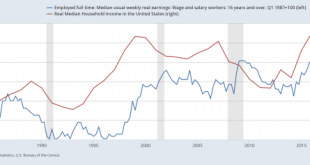from Lars Syll To-day, in many parts of the world, it is the serious embarrassment of the banks which is the cause of our gravest concern … [The banks] stand between the real borrower and the real lender. They have given their guarantee to the real lender; and this guarantee is only good if the money value of the asset belonging to the real borrower is worth the money which has been advanced on it. It is for this reason that a decline in money values so severe as that which we are now...
Read More »Kevin Warsh as Fed Chair: The art of marrying rich and falling upward
from Dean Baker Since the dawn of time men have married into prominent families as a way to improve their career prospects, but as Jared Kushner can attest, the returns to marrying well have never been greater. We may see further proof of this proposition if Donald Trump selects Kevin Warsh to replace Janet Yellen as chair of the Federal Reserve Board. Like Kushner, Warsh’s secret to success seems to rest largely on the family he married into. Warsh’s father-in-law is the billionaire...
Read More »Nobel economics: the behaviorism of economic decisions and its secret
from David Ruccio Lots of folks have been asking me about the significance of the so-called Nobel Prize in economics that was awarded yesterday to Richard Thaler. They’re interested because they’ve read or heard about the large catalog of exceptions to the usual neoclassical rule of rational decision-making that has been compiled by Thaler and other behavioral economists. One of my favorites is the “ultimatum game,” in which a player proposes an allocation of an endowment (say $5) and the...
Read More »Microeconomics: an Islamic approach
from Asad Zaman At the heart of modern economic theory is the micro-economic model of homo economicus, who is cold, calculating and callous. This picture of humans as heartless rational robots is what leads to “Poisoning the Well: How Economic Theory damages our moral imagination” (Julie Nelson). I have provided a thorough critique of neoclassical utility theory in my paper: The Empirical Evidence Against Neoclassical Utility Theory: A Review of the Literature,” International Journal of...
Read More »Nudges, individual behavior and neoliberalism
from Maria Alejandra Madi The concept of nudge became popular after the publication of the 2008 book Nudge: Improving decisions about health, wealth, and happiness, written by Cass Sunstein and the most recent Nobel Laureate, Richard Thaler. According to the authors, nudge refers to “any aspect of the choice architecture that alters people’s behavior in a predictable way without forbidding any options or significantly changing their economic incentives. To count as a mere nudge, the...
Read More »Nobel Committee making a colossal fool of itself
from Lars Syll In its ‘scientific background’ description on the 2017 ‘Nobel prize’ in economics, The Royal Swedish Academy of Sciences writes (emphasis added): In order to build useful models, economists make simplifying assumptions. A common and fruitful simplification is to assume that agents are perfectly rational. This simplification has enabled economists to build powerful models to analyze a multitude of different economic issues and markets. What absolute nonsense! Writing this...
Read More »Richard Thaler gets the 2017 ‘Nobel prize’
from Lars Syll Today The Royal Swedish Academy of Sciences announced that it has decided to award The Sveriges Riksbank Prize in Economic Sciences in Memory of Alfred Nobel for 2017 to Richard Thaler. A good choice for once! To yours truly Thaler’s main contribution has been to show that one of the main building blocks of modern mainstream economics — expected utility theory — is fundamentally wrong. If a friend of yours offered you a gamble on the toss of a coin where you could lose...
Read More »Modern macro-economics and the sad truth about decoupling
Decoupling is the idea that when societies get richer, additional units of GDP will require less physical resources and will produce less carbon dioxide. This seems true when we look at national rich country production data. But it is not true when we look at rich country consumption data – as we outsourced energy and material intensive parts of producing our consumption goods to developing countries. We really have to blame our consumption pattern… Look here for an article of Mir and...
Read More »Inequality and immiseration (4 graphs)
from David Ruccio It’s clear that, for decades now, American workers have been falling further and further behind. And there’s simply no justification for this sorry state of affairs—nothing that can rationalize or excuse the growing gap between the majority of people who work for a living and the tiny group at the top. But that doesn’t stop mainstream economists from trying. Look, they say, American workers are clearly better off than they were before. Both real weekly earnings (the...
Read More »Yes, economics has a problem with women
from Julie Nelson Yes, economics has a problem with women. In the news recently we’ve heard about the study of the Economics Job Market Rumors (EJMR) on-line forum. Student researcher Alice H. Wu found that posts about women were far more likely to contain words about their personal and physical issues (including “hot,” “lesbian,” “cute,” and “raped” ) than posts about men, which tended to focus more on academic and professional topics. As a woman who has been in the profession for over...
Read More » Real-World Economics Review
Real-World Economics Review




